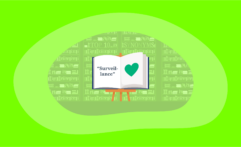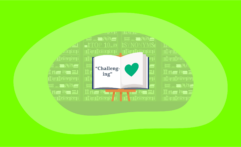Top 10 Positive & Impactful Synonyms for “Mental Illness” (With Meanings & Examples)
Affiliate Disclosure
Hey fellow impactful ninja ?
You may have noticed that Impactful Ninja is all about providing helpful information to make a positive impact on the world and society. And that we love to link back to where we found all the information for each of our posts.
Most of these links are informational-based for you to check out their primary sources with one click.
But some of these links are so-called "affiliate links" to products that we recommend.
Why do we add these product links?
First and foremost, because we believe that they add value to you. For example, when we wrote a post about the environmental impact of long showers, we came across an EPA recommendation to use WaterSense showerheads. So we linked to where you can find them. Or, for many of our posts, we also link to our favorite books on that topic so that you can get a much more holistic overview than one single blog post could provide.
And when there is an affiliate program for these products, we sign up for it. For example, as Amazon Associates, we earn from qualifying purchases.
What do these affiliate links mean for you?
First, and most importantly, we still only recommend products that we believe add value for you.
When you buy something through one of our affiliate links, we may earn a small commission - but at no additional costs to you.
And when you buy something through a link that is not an affiliate link, we won’t receive any commission but we’ll still be happy to have helped you.
What do these affiliate links mean for us?
When we find products that we believe add value to you and the seller has an affiliate program, we sign up for it.
When you buy something through one of our affiliate links, we may earn a small commission (at no extra costs to you).
And at this point in time, all money is reinvested in sharing the most helpful content with you. This includes all operating costs for running this site and the content creation itself.
What does this mean for me personally?
You may have noticed by the way Impactful Ninja is operated that money is not the driving factor behind it. It is a passion project of mine and I love to share helpful information with you to make a positive impact on the world and society. However, it's a project in that I invest a lot of time and also quite some money.
Eventually, my dream is to one day turn this passion project into my full-time job and provide even more helpful information. But that's still a long time to go.
Stay impactful,
Mental health challenge, mental resilience, and healing process—positive and impactful synonyms for “mental illness” enhance your vocabulary and help you foster a mindset geared toward making a positive impact. So, we had to ask: What are the top ten positive & impactful synonyms for “mental illness”?
The top 10 positive & impactful synonyms for “mental illness” are mental health challenge, psychological condition, emotional health issue, behavioral health concern, wellness journey, mental resilience, emotional well-being, mindfulness challenge, recovery path, and healing process. Using these synonyms helps you enhance both your communication and psychological resilience in several meaningful ways.
In the table below, you can see all these top ten synonyms including their descriptions, why they are positive and impactful synonyms for “mental illness,” and example sentences that highlight how you can use each of these. We’ll then also share ten benefits of why you should use these synonyms, ten interesting facts about the word “mental illness,” and a brief history of the development of our alphabet.
Here Are the Top 10 Positive & Impactful Synonyms for “Mental Illness”
Our list of positive & impactful synonyms for “mental illness” help you expand your vocabulary and enhance both your communication and psychological resilience in several meaningful ways (you can read more about it in the next section).
That’s why it’s so important to focus on synonyms that can be used in a positive and impactful way.
Mental Illness: a condition which causes serious disorder in a person’s behaviour or thinking
Oxford Dictionary
Our top ten synonyms for “mental illness” exemplify the beauty of our language—their meaning is not just fixed but can be shaped by the context they are used in.
| Synonym | Description | Example Sentence |
| Mental health challenge | A difficulty or obstacle related to mental health, emphasizing resilience and the potential for overcoming, akin to ‘mental illness’. | “Facing a mental health challenge, he sought therapy and support from loved ones.” |
| Psychological condition | A state affecting the mind, highlighting the medical aspect without stigma, paralleling ‘mental illness’ but focusing on the condition aspect. | “She manages her psychological condition with a combination of medication and mindfulness practices.” |
| Emotional health issue | A problem related to emotional well-being, akin to ‘mental illness’, underscoring the focus on emotional aspects of health. | “He’s been open about his emotional health issue, which has encouraged others to seek help.” |
| Behavioral health concern | A concern related to patterns of behavior and mental well-being, emphasizing a broad view of mental health akin to ‘mental illness’. | “The school’s counselor provides support for students with behavioral health concerns.” |
| Wellness journey | The process of seeking and maintaining mental health, akin to ‘mental illness’, with a positive spin on the path towards wellness. | “Her wellness journey inspired many who also struggle with their mental health.” |
| Mental resilience | The capacity to recover from mental health challenges, highlighting a strength-based perspective akin to ‘mental illness’. | “His mental resilience in the face of adversity has been remarkable.” |
| Emotional well-being | A state of positive emotional health, offering a broader and more positive perspective than ‘mental illness’. | “Focusing on emotional well-being is crucial for overall happiness.” |
| Mindfulness challenge | A challenge that requires mindful attention and care, presenting ‘mental illness’ in a context that emphasizes personal growth and awareness. | “She considers her mindfulness challenge an important part of her daily routine for mental health.” |
| Recovery path | The journey toward improving mental health, framing ‘mental illness’ in the context of hope and progress. | “Joining a support group has been a vital step on his recovery path.” |
| Healing process | The process of making or becoming sound or healthy again, akin to ‘mental illness’ but with a focus on the journey to recovery. | “The healing process from any mental health issue is personal and unique to each individual.” |
10 Benefits of Using More Positive & Impactful Synonyms
Our positive & impactful synonyms for “mental illness” help you expand your vocabulary and enhance both your communication and psychological resilience in several meaningful ways:
- Encouraging Positive Framing: Using positive synonyms allows for a more optimistic and affirmative way of expressing thoughts. This can influence not only the speaker’s or writer’s mindset but also positively impact the audience’s perception and reaction.
- Improving Emotional Intelligence: Learning different positive synonyms helps in accurately expressing emotions. This aids in emotional intelligence, as one can more precisely convey feelings and understand the emotions of others.
- Enhancing Persuasive Communication: In persuasive writing and speaking, using positive synonyms can be more effective in convincing an audience, as people generally respond better to positive language.
- Broadening Emotional Vocabulary: A range of positive synonyms enriches your emotional vocabulary. It’s one thing to say you’re “happy” and another to express that you’re “elated,” “joyful,” or “content.” Each word carries a unique emotional hue.
- Creating a Positive Atmosphere: The use of positive language can create a more constructive and encouraging atmosphere in both personal and professional settings. This can lead to better teamwork, more effective communication, and improved interpersonal relationships.
- Enhancing Creative Writing: For those engaged in creative writing, a repertoire of positive synonyms can help in vividly depicting scenes, characters, and emotions, making the narrative more engaging and lively.
- Improving Mental Illness and Well-being: Regularly using and thinking in terms of positive words can influence one’s mental state and outlook on life. Positive language has been linked to greater well-being and a more optimistic outlook.
- Improving Cognitive Flexibility: Expanding your vocabulary with positive synonyms enhances your cognitive flexibility. This means you become more adept at thinking creatively and adapting your language use to different situations. The mental exercise involved in learning and using a variety of positive words can also contribute to overall cognitive health, keeping your mind sharp and responsive.
- Building Social Skills and Empathy: When you have a variety of positive words at your disposal, you’re better equipped to offer compliments, encouragement, and empathetic responses in social interactions.
- Facilitating Conflict Resolution: In situations of conflict, the use of positive language can help de-escalate tension. Having a range of positive synonyms allows for more constructive and diplomatic communication.
Overall, your use of positive synonyms not only broadens your vocabulary but also positively influences your thought processes, emotional expression, and interpersonal interactions.
10 Interesting Facts About the Phrase “Mental Illness”
Let’s take a step back and have a look at some interesting facts about the word “mental illness”.
- Etymology of “Mental”: The term “mental” originates from the Latin word “mentalis,” meaning “of the mind,” which is derived from “mens” for “mind.” This highlights its focus on cognitive and emotional aspects of health.
- Etymology of “Illness”: “Illness” comes from the Old English “seocnes,” meaning “sickness.” The term has evolved to encompass a wide range of health issues, including those of the mind.
- Historical Understanding: Historically, mental illnesses were poorly understood and often attributed to supernatural forces or divine punishment.
- Evolution of Treatment: Treatment for mental illness has evolved from confinement and inhumane methods to more compassionate, science-based approaches.
- Psychiatry’s Role: The field of psychiatry, established in the 19th century, marked a significant shift towards medical and therapeutic treatment models for mental illness.
- Impact of World Wars: The World Wars of the 20th century were pivotal in advancing the understanding of mental health, as they highlighted the psychological impacts of trauma.
- Deinstitutionalization: The late 20th century saw a move towards deinstitutionalization, aimed at treating individuals with mental illness within the community rather than in isolated asylums.
- Awareness and Advocacy: The late 20th and early 21st centuries have seen increased awareness and advocacy for mental health, reducing stigma and improving access to care.
- Global Health Issue: Mental illness is a significant global health issue, with disorders such as depression and anxiety being among the leading causes of disability worldwide.
- Neuroscience Advances: Advances in neuroscience and imaging technologies have improved understanding of the biological bases of many mental illnesses.
A Brief History of Our Alphabet
The story of our alphabet has a rich and compelling history, beginning with ancient civilizations and carrying forward into the present day.
The history of our modern alphabet is a fascinating journey that spans several millennia and cultures. It’s commonly referred to as the Latin or Roman alphabet, and here’s a brief overview of its evolution:
- Phoenician Alphabet (circa 1050 BCE): The story begins with the Phoenician alphabet, one of the oldest writing systems known to use a one-to-one correspondence between sounds and symbols. This Semitic alphabet had about 22 consonants, but no vowels, and was primarily used for trade.
- Greek Alphabet (circa 800 BCE): The Greeks borrowed and adapted the Phoenician script. Crucially, they introduced vowels, making it one of the first true alphabets where each symbol represented a distinct sound (both vowel and consonant). The Greek alphabet had a significant influence on the development of other alphabets.
- Etruscan Alphabet (circa 700 BCE): The Etruscan civilization in Italy adapted the Greek alphabet to their own language. While Etruscan was largely replaced by Latin, their version of the alphabet was a key predecessor to the Roman one.
- Latin Alphabet (circa 700 BCE – Present): The Latin alphabet emerged from the adaptation of the Etruscan script. Ancient Rome used this alphabet, and it spread across Europe as the Roman Empire expanded. The original Latin alphabet did not contain the letters J, U, and W. These were added much later along with other modifications to suit different languages and phonetic needs.
- Modern Variations: Today, the Latin alphabet is the most widely used alphabetic writing system in the world. It has undergone various changes to accommodate different languages and sounds. For instance, English—among other languages—added letters like ‘J’, ‘U’, and ‘W’, while other languages incorporate additional characters like ‘Ñ’ in Spanish or ‘Ç’ in French.
This evolution reflects not just linguistic changes but also cultural and historical shifts, as the alphabet was adapted by different societies across centuries.
Final Thoughts
Expanding your vocabulary is akin to broadening your intellectual horizons and enhancing your capacity to express your thoughts and emotions with precision. By embracing additional synonyms for “mental illness,” you’re not just learning new terms, but you’re also gaining nuanced ways to communicate positivity and impact.
The more words you have at your disposal, the more accurately and vividly you can paint your thoughts into speech and writing. So, by growing your vocabulary, especially with positive and impactful words, you’re empowering yourself to engage more effectively and inspiringly with the world around you.
Stay impactful,

Sources
- Society for Personality and Social Psychology: Why a Simple Act of Kindness Is Not as Simple as It Seems: Underestimating the Positive Impact of Our Compliments on Others
- Journal of Personality: Psychological Resilience and Positive Emotional Granularity: Examining the Benefits of Positive Emotions on Coping and Health
- David Sacks: Letter Perfect: The Marvelous History of Our Alphabet From A to Z
- Impactful Ninja: Positive & Impactful Words Starting With A
- Impactful Ninja: Positive & Impactful Words Starting With B
- Impactful Ninja: Positive & Impactful Words Starting With C
- Impactful Ninja: Positive & Impactful Words Starting With D
- Impactful Ninja: Positive & Impactful Words Starting With E
- Impactful Ninja: Positive & Impactful Words Starting With F
- Impactful Ninja: Positive & Impactful Words Starting With G
- Impactful Ninja: Positive & Impactful Words Starting With H
- Impactful Ninja: Positive & Impactful Words Starting With I
- Impactful Ninja: Positive & Impactful Words Starting With J
- Impactful Ninja: Positive & Impactful Words Starting With K
- Impactful Ninja: Positive & Impactful Words Starting With L
- Impactful Ninja: Positive & Impactful Words Starting With M
- Impactful Ninja: Positive & Impactful Words Starting With N
- Impactful Ninja: Positive & Impactful Words Starting With O
- Impactful Ninja: Positive & Impactful Words Starting With P
- Impactful Ninja: Positive & Impactful Words Starting With Q
- Impactful Ninja: Positive & Impactful Words Starting With R
- Impactful Ninja: Positive & Impactful Words Starting With S
- Impactful Ninja: Positive & Impactful Words Starting With T
- Impactful Ninja: Positive & Impactful Words Starting With U
- Impactful Ninja: Positive & Impactful Words Starting With V
- Impactful Ninja: Positive & Impactful Words Starting With W
- Impactful Ninja: Positive & Impactful Words Starting With X
- Impactful Ninja: Positive & Impactful Words Starting With Y
- Impactful Ninja: Positive & Impactful Words Starting With Z




